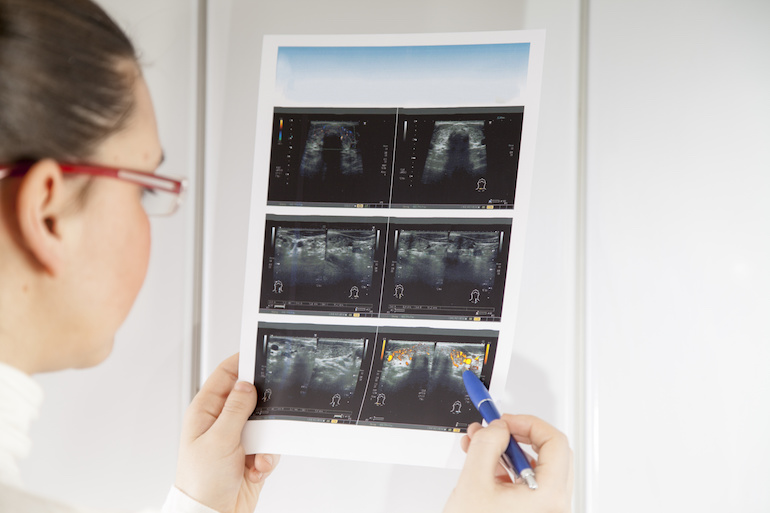Ruthie Harper, M.D. on Hashimoto's Thyroiditis

Hashimoto's thyroiditis is an autoimmune disorder in which your immune system attacks your thyroid gland. Because of this attack, the thyroid gland can slowly become damaged and destroyed, leading to a reduction in thyroid hormone levels or hypothyroidism.
Many people think of Hashimoto’s as only a thyroid disease, missing the immune imbalance that is the source of the problem. If the underlying autoimmune process goes unaddressed, and instead only thyroid hormone replacement is focused on, the individual with Hashimoto’s ends up being only partially treated. The result is an individual who misses out on the opportunity to become totally healthy and optimally well.
Hashimoto's thyroiditis diagnosis
In order to effectively treat Hashimoto’s Disease, it is critical to address both the reason the body is attacking itself as well as ensuring that any loss of thyroid hormone production is resolved with balanced thyroid hormone replacement.
Greater than 90% of people diagnosed with hypothyroidism have Hashimoto’s thyroiditis, and women are ten times more likely to have Hashimoto’s than men. Hashimoto’s commonly occurs during major shifts in a person’s life. For women it is common after pregnancy or during perimenopause or menopause. For both men or women, it can occur after a period of high stress. Fifty percent of people with Hashimoto’s go undiagnosed, unaware that they have thyroid disease.

The high prevalence of Hashimoto’s makes it important to frequently screen for thyroid hormone imbalances as well as test for the production of thyroid antibodies which are diagnostic for Hashimoto’s disease. Unfortunately, because thyroid antibodies can fluctuate in Hashimoto’s thyroiditis, a negative antibody does not necessarily rule out Hashimoto’s disease. A skilled physician will repeat the antibody testing multiple times in a person with symptoms consistent with Hashimoto’s disease because of this fluctuation in thyroid antibodies.
If the autoimmune condition is left unaddressed, the opportunity to rebalance the immune system is missed putting the individual at risk for a second or third autoimmune condition- such a carditis (immune attack on the heart), hepatitis (immune attack on the liver) as well as other severe autoimmune conditions.
Symptoms of Hashimoto’s can include:

1. anxiety
2. fatigue
3. weight gain or an inability to lose weight
4. depression
5. irritability
6. memory loss
7. difficulty concentrating
8. hair loss or dry, brittle hair
9. dry skin
10. difficulty swallowing
11. constipation
12. sensitivity to cold
13. joint and muscle pain
14. high cholesterol
Many doctors screen for thyroid function with a TSH and if it falls within normal ranges, the thyroid is considered normal and healthy. However, a complete thyroid evaluation requires TSH testing as well as total T4, free T4, free T3, reverse T3, and thyroid antibodies (both thyroglobulin and thyroid peroxidase) to determine functional thyroid status as well as Hashimoto’s status. This will also help to determine the necessary type of thyroid hormone replacement if needed. Types of hormone replacement include:
Compounded T3, T4 thyroid hormone - It can be made sustained release and at the exact dosage necessary. Nutrients critical to thyroid function, like selenium, can also be added and fillers can be avoided.
Armour – Dessicated thyroid derived from pig
Synthroid – Synthetic T4 that converts to T3. Contains fillers.
Cytomel – Synthetic T3 thyroid hormone
The underlying causes of autoimmunity will be unique for each individual, requiring a personalized approach to healing and getting well while supplementing with hormone replacement for as long as necessary. Some important areas that should be evaluated include:
Immune and Gut Health
Infections, exposure to antibiotics, an inflammatory diet of processed and GMO foods, and exposure to chemicals, can over-stimulate the immune system and increase the production of inflammatory molecules in the body as well as disrupt the balance of the gut microbiome.
Stress and Adrenal Health
Chronic, high or low grade stress and lack of sleep can increase the production of cortisol and tax the adrenal glands, leading to a cascade of hormone imbalance that can include insulin, leptin, ghrelin, and reproductive hormones.
Read more about the effects of stress.
Genetics
A genetic region called HLA as well as the gene CTLA-4 play roles in our susceptibility to autoimmune disease and SNPs in these regions will raise the risk of autoimmunity. In addition, the FOXE1 gene is involved in the conversion of T4, the inactive form of thyroid to T3, the active form.
Nutritional Status
Deficiencies in vitamin D, iron, essential fatty acids, selenium, iodine, and other nutrients that can impair mitochondrial function will ultimately prevent the thyroid from doing its job. The consumption of grains, dairy, and soy have also been linked to Hashimoto’s. A nutritionally dense diet free from grains, dairy, and soy, and supplementation will optimize nutrition and lower the risk of an autoimmune condition.
Detoxification
The buildup of toxins in the body or the inability to eliminate toxins will prevent cells from functioning optimally. Chemical-free, organic personal care and biodegradable cleaning products, and a diet free of processed foods and GMO’s can help lessen the load of toxins that enter the body.
Environment
Exposure to xenobiotics in the air, water, home, car, or workplace can damage the thyroid and cell function. Air and water purifiers, clean personal care and cleaning products and a diet free of processed foods and GMO’s can help minimize exposure to xenobiotics.

Identification of Hashimoto’s Disease is an important first step in treating autoimmune hypothyroidism. Thyroid hormone replacement as well as diet, nutrition, and lifestyle changes can then be implemented to stop the immune system’s attack on the thyroid and restore its function.
Ruthie Harper MD |
Dr. Harper is a Board Certified Internist who founded a functional and integrative medical practice in Austin, Texas in 1999. She specializes in creating customized programs to diagnose and treat chronic health conditions, including Hashimoto’s Disease. Her programs go beyond traditional medications to include nutrition, supplementation, lifestyle changes, bioidentical hormones and personalized exercise recommendations and she has had success in helping thousands of her patients achieve the optimal health and wellness that every person deserves. |
